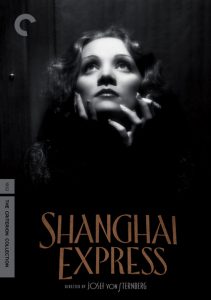Shanghai Express-1932
Director Josef Von Sternberg
Starring Marlene Dietrich, Clive Brook
Scott’s Review #913
Reviewed June 29, 2019
Grade: A-
A film way ahead of its time and firmly affixed to the female perspective, Shanghai Express (1932) is riddled with drama, intrigue, and adventure, culminating in a slightly too tidy ending.
Forgetting that slight embrace with the traditional been there, done that film climax, the story has layers of interesting tidbits and will assuredly keep audiences on their toes.
Marlene Dietrich sizzles in the lead role and benefits from the film’s being made before the American code, which put restrictions on pictures and watered down many.
With flashes of a story like Murder on the Orient Express, Shanghai Express gets off to a strong start as a group of strangers of differing backgrounds begin to board the self-titled train from Istanbul, Turkey, through civil war-torn China.
This stir is caused by the presence of Shanghai Lily (Dietrich), a woman of questionable morals, with her sidekick Hui Fei (Anna May Wong) in tow.
Lily reconnects with her former flame, Captain Donald Harvey (Clive Brook), as passengers shun her and political matters reach the boiling point, leading Lily to prove her undying love for Donald.
Considering that the film was made in 1932, the plot and surrounding elements all resound as female-driven, which is both courageous and forceful.
Dietrich is glamorous and photographs beautifully, with no better example than the scene when she trembles and shivers in fear as she clings to a cigarette, her character deep in thought and anxiety.
The image and lighting were so powerful that they became the cover art for the promotional photograph. A promiscuous woman who is never ashamed of who she is, Lily proudly proclaims the immortal line, “It took more than one man to change my name to Shanghai Lily.”
The mysterious and deadly Hui Fei, Anna May Wong, nearly overshadows Dietrich. With her exotic demeanor, the audience is perplexed by her, not knowing much about her, and longing for more exposure and reveals.
Hui Fei comes full tilt during the final act but remains an elusive character. Throughout the film’s short runtime, which is one hour and thirty-two minutes, I found myself thinking about Hui Fei continuously, wanting more explanation about her life, her background, and how she came to be associated with Shanghai Lily.
The film’s atmosphere is a championed success. The roaring engines of the fast-moving train, mixed with the bells and dazzling, luxurious train cars, make the background details tremendously important, keeping the fast-paced action ongoing and crackling.
The supporting characters like judgmental Christian missionary Mr. Carmichael (Lawrence Grant), who at first condemns the two as “fallen women,” and the boarding housekeeper Mrs. Haggerty (Louise Closser Hale) with her strictness for discipline and cleanliness, add life and an excellent comic balance to the heavy drama.
Shanghai Express’s tremendous attributes, cagey female characters, and perspective have such strong appeal that they ultimately lead to a glaring letdown at the end of the film.
Understood is how Lily is madly in love with Donald, and the physical tension they share throughout the film is palpable and noticeable. She is willing to agree to go with the film’s villain, the dastardly Chang (Warner Oland), to his palace, presumably for sex or to become his kept woman, all in the name of her love for Donald.
Lily and Donald find their way to a strong embrace as the film ends, but this feels contrived given the immense other qualities.
Lovely is having the experience of viewing a film that is not too distant from celebrating its one-hundredth anniversary and noticing aspects highly influential to other films.
Thanks to Dietrich’s fantastic performance and cleverly written characters, the film is a high achievement and should be exposed to young film fans studying in film school as evidence of an early treasure.
Shanghai Express (1932) is a cinematic success with complexities and voracious theater.
Oscar Nominations: 1 win– Outstanding Production, Best Director-Josef Von Sternberg, Best Cinematography (won)
